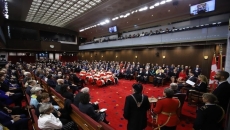The Liberals are proposing to increase the value of benefits for unemployed workers to $500 a week under newly tabled legislation that lands days before aid runs out for millions.
It follows a demand from the New Democratic Party, whose leader Jagmeet Singh condemned the Liberals for planning to reduce benefits to $400 a week.
The proposal still needs parliamentary approval, but would bring the value of payments to the same level as under the soon-to-disappear Canada Emergency Response Benefit, or CERB.
The same $500-a-week floor would be placed under employment insurance benefits for those eligible for the program.
The Liberals first unveiled a package of three benefits and an expanded employment insurance program to replace the CERB in August, days after Parliament was prorogued.
The country's finance and employment ministers downplayed any political calculations in the language of the bill introduced in the House of Commons on Thursday, which requires some opposition support for it to become law.
"We really were trying to be flexible from the beginning. We landed here because this is where the country is now in terms of the support workers need," Employment Minister Carla Qualtrough said.
But the bill does more than just reshape aid for people who aren't able to work, whether it's because they don't have jobs or can't work because they are ill or have to stay home to take care of children or family members for pandemic-related reasons.
It also includes $1.5 billion to send to provinces for training programs as a first instalment of money linked to the government's throne-speech promise to help Canadians improve or acquire skills to help them in a shifting labour market.
And it also asks Parliament to give the government emergency spending powers until the end of the year on what Finance Minister Chrystia Freeland said are specific measures to combat the pandemic, such as vaccines.
Still, Freeland said the government expects to have to come back to Parliament for spending approval on additional programs as the need arises.
The CERB has paid out some $78 billion to nearly 8.8 million people since the onset of the pandemic, covering those who are and are not eligible for employment insurance.
Bumping the value of the new benefits will mean that about 750,000 people would receive less than under the CERB, down from the 2.7 million the Canadian Centre for Policy Alternatives estimated under the Liberals' previous proposal.
"It's certainly a big improvement in the program," said CCPA senior economist David Macdonald, who ran the updated numbers.
"I don't think this will change the unnecessary messiness of the rollover from from CERB to EI or some of these new programs in the sense that it doesn't help people figure out where they should apply or not apply," he added. "However, for most people now, the benefits are the same, if not better."
The government estimates about 2.8 million people receiving CERB payments will move to EI, and Qualtrough said she is confident it will be a smooth transition for the decades-old EI system.
Everyone else will need to wait for parliamentary approval even as the CERB winds down beginning this weekend.
"We have been working with the other parties all along through this process, so I stress urgency because we're now rolling up our sleeves to get this past the finish line," Qualtrough said about the Liberals' push for speedy passage of the bill.
The NDP's Singh said he's happy to see the increase in unemployment benefits, but on Thursday afternoon his party was still negotiating better access to the sickness provisions before the party could support the legislation.
"For a worker in Canada, if they fall sick, they should not have to make the impossible choice — do I go to work sick, infecting my colleagues, or do I stay at home risking not being able to pay my bills because I'm not being paid," he said.
"We don't want them to be faced with that."
Conservative employment critic Peter Kent called it unacceptable for the Liberals to try ramming through the legislation when they could have gotten the ball rolling before prorogation, knowing the CERB was set to end.
"Instead of showing leadership and presenting Canadians with a clear path forward through the pandemic, the Trudeau Liberals continue to let Canadians down," he said in a statement.






.jpg)